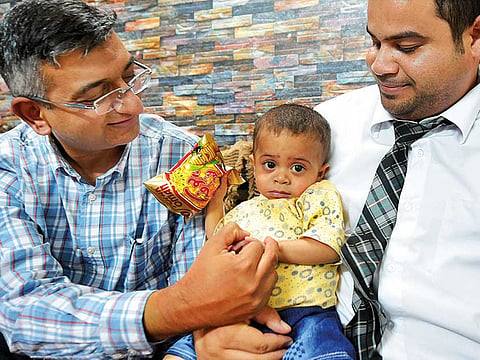One-year-old toddler thrives after liver transplant
Hamad weighed only 4.5kg when the transplant was performed earlier this year

Abu Dhabi: A successful transplant has saved a one-year-old boy in Abu Dhabi from dying due to a congenital liver disease, Gulf News has learnt.
Baby Hamad’s surgery was miraculous not only because it was performed at such a young age but also because he weighed only 4.5 kilograms at the time. Now aged 16 months, the boy is recovering well and is a source of much joy to his parents.
“My son was always crying and he was never happy or comfortable in the year before the procedure. Now, he interacts with us and is just as happy as a healthy baby,” Mohammad Raheem, Hamad’s father, told Gulf News.
Raheem is a 25-year-old administrative executive from Pakistan, and Hamad is his second son. Soon after Hamad was born to Raheem and wife Zarjan, 23, in April 2017, something seemed amiss. He showed symptoms of jaundice, including a persistently yellow complexion, but nothing was diagnosed until the family returned to their home in Abu Dhabi four months later.
A series of checks at a government hospital revealed that Hamad had been born with extrahepatic biliary atresia, a condition in which the liver’s bile ducts do not develop normally. In Hamad’s case, the ducts were outside the liver, and would not deliver the bile to his intestines for digestion.
The family sought advice from Dr Kaiser Raja, consultant for liver diseases and transplantation at Aster Hospital Dubai.
“If the condition had been diagnosed before Hamad had turned two months, a simple procedure could have been performed to place the ducts in a way that created a connection between the liver and the intestines. But Hamad was older, and a transplant was the only option. The complication was that he was less than a year old, and did not weigh even 10 kilograms,” Dr Raja said.
The doctor therefore advised that the family continue to monitor Hamad and wait till he had put on a little more weight. This would also ensure that Hamad’s liver would grow in size some more, making it easier to create the vessel and duct connections during the transplantation surgery. Meanwhile, it was ascertained that Zarjan was a good candidate to donate a part of her liver to her son.
The couple continued to take care of their second-born son while regularly seeing Dr Raja. But things did not improve much and by December 2017, the baby weighed just 4.5 kilograms. He was also suffering from repeated infections, his jaundice had not abated, and he had fluid build-up in his body — one of the earliest signs of liver failure.
“The fear was that Hamad would not live much longer without transplant, and so we decided to schedule the surgery as soon as possible,” the doctor said.
The family began processing their documents to travel to Bengaluru, India so that the surgery could take place at the Aster CMI Hospital. Meanwhile, the Dh100,000 cost for the transplant was generously provided by UAE-based charities, including the Emirates Red Crescent and the Sharjah Charity.
The family travelled to Bengaluru in February, and in March 2018, the transplant was performed. The complicated procedure took about 10 hours, and a team of surgeons worked to transplant 100 grams of Zarjan’s donated liver into Hamad, including making all the blood vessel and duct connections for the organ to function.
Hamad came out of the surgery fine, but did develop a few infections afterwards that kept him hospitalised, often in intensive care, for more than a month. But since then, he has continued to grow and now weighs more than seven kilograms.
“He will still need lifelong medications to ensure that the liver is not rejected. But in general, liver transplant recipients go on to live healthy lives. The five-year survival rate is estimated to be 85 per cent for children,” Dr Raja said.
“With that being said, Hamad was the smallest child we’ve operated on within the Aster Group so far, even though we’ve had 42 children below the age of 10 years undergo transplants during the last two years,” he added.
Raheem and his wife are, meanwhile, overjoyed to see their son thriving.
Hamad was the smallest child we’ve operated on within the Aster Group so far, even though we’ve had 42 children below the age of 10 years undergo transplants during the last two years.”
“He laughs a lot and plays with us and his two-year-old brother, Zayed. We are so grateful to the team of doctors at Aster, and to the UAE and its leaders, for making all of this a reality for us,” he said.


